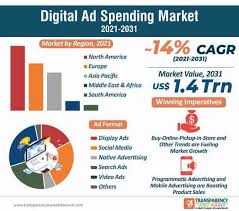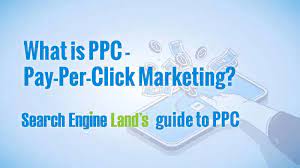The Internet Advertising Market: Trends and Opportunities
Internet advertising has become an integral part of the digital marketing landscape, with businesses leveraging online platforms to reach their target audiences effectively. The internet advertising market is constantly evolving, driven by changing consumer behaviour, technological advancements, and industry trends.
Key Trends in the Internet Advertising Market
Mobile Advertising: With the increasing use of smartphones and mobile devices, mobile advertising has seen significant growth. Advertisers are focusing on creating mobile-responsive ads to engage users on the go.
Programmatic Advertising: Programmatic advertising has revolutionised the way ads are bought and sold online. Automated processes enable real-time bidding and targeting based on user data, improving ad relevance and performance.
Video Advertising: Video content continues to gain popularity among internet users, leading to a rise in video advertising. Businesses are investing in video ads on platforms like YouTube and social media to capture audience attention.
Opportunities in the Internet Advertising Market
Personalisation: Tailoring ads based on user preferences and behaviour allows for more targeted campaigns that resonate with audiences. Personalised advertising can lead to higher engagement and conversion rates.
Data-driven Marketing: Leveraging data analytics enables advertisers to track campaign performance, measure ROI, and make informed decisions for future strategies. Data-driven marketing helps optimise ad spend and improve overall effectiveness.
Cross-Channel Marketing: Integrating multiple channels such as social media, search engines, and display ads creates a cohesive marketing strategy that reaches consumers at various touchpoints. Cross-channel marketing enhances brand visibility and engagement.
The Future of Internet Advertising
The internet advertising market is poised for continued growth as technology advances and consumer preferences evolve. Innovations such as AI-driven ad targeting, immersive ad formats like augmented reality, and voice-activated advertising present new opportunities for advertisers to connect with audiences in meaningful ways.
In conclusion, the internet advertising market offers a dynamic landscape for businesses to promote their products and services effectively. By staying abreast of trends and embracing emerging technologies, advertisers can harness the power of online platforms to drive brand awareness, engagement, and conversions.
Understanding the Internet Advertising Market: Answers to Common Questions
- What is internet advertising and how does it work?
- What are the benefits of internet advertising for businesses?
- How much does internet advertising cost on average?
- What are the different types of internet advertising formats available?
- How can businesses measure the effectiveness of their internet advertising campaigns?
- What role does targeting play in internet advertising?
- Are there any regulations or guidelines that govern internet advertising practices?
- How has mobile usage impacted the internet advertising market?
- What trends are shaping the future of the internet advertising industry?
What is internet advertising and how does it work?
Internet advertising refers to the practice of promoting products or services through online channels such as websites, search engines, social media platforms, and mobile apps. It involves creating and placing ads that target specific audiences based on demographics, interests, and behaviour. Internet advertising works by utilising various techniques such as display ads, search engine marketing, social media advertising, and email marketing to reach potential customers. Advertisers bid for ad placement on websites or platforms where their target audience is likely to be present. By analysing data and tracking performance metrics, advertisers can measure the effectiveness of their campaigns and make data-driven decisions to optimise their online advertising strategies for better results.
What are the benefits of internet advertising for businesses?
Internet advertising offers a multitude of benefits for businesses looking to enhance their marketing strategies. One key advantage is the ability to reach a vast global audience, allowing businesses to target specific demographics and interests with precision. Internet advertising also provides measurable results, enabling businesses to track campaign performance in real-time and optimise their strategies accordingly. Cost-effectiveness is another significant benefit, as online ads often have lower costs compared to traditional advertising methods. Furthermore, internet advertising allows for greater flexibility and creativity in ad formats, including video, display ads, and interactive content, which can help businesses engage and connect with their target audience more effectively. Overall, internet advertising presents businesses with a powerful tool to increase brand visibility, drive traffic, and ultimately boost sales and conversions.
How much does internet advertising cost on average?
The cost of internet advertising can vary widely depending on various factors such as the advertising platform, ad format, targeting options, and campaign objectives. On average, businesses can expect to pay anywhere from a few pence to several pounds per click (CPC), per thousand impressions (CPM), or per action (CPA) for online ads. The pricing model chosen, competition in the market, and the quality of the ad placements all play a significant role in determining the overall cost of internet advertising. It is essential for businesses to set clear goals, define their target audience, and carefully monitor and adjust their ad campaigns to maximise the return on investment in this dynamic and competitive digital advertising landscape.
What are the different types of internet advertising formats available?
When exploring the diverse landscape of the internet advertising market, it is essential to understand the various types of advertising formats available to businesses. Some common formats include display ads, which are visual banners or images displayed on websites; search engine marketing (SEM), where ads appear in search engine results based on keywords; social media advertising, which includes sponsored posts and targeted ads on platforms like Facebook and Instagram; video advertising, such as pre-roll ads on YouTube; native advertising, seamlessly integrated into online content to mimic the platform’s style; and email marketing, utilising promotional messages sent directly to users’ inboxes. Each format offers unique advantages and can be tailored to suit specific marketing objectives and target audiences within the dynamic realm of internet advertising.
How can businesses measure the effectiveness of their internet advertising campaigns?
Businesses can measure the effectiveness of their internet advertising campaigns through various key performance indicators (KPIs) that provide valuable insights into campaign performance. Metrics such as click-through rates, conversion rates, return on investment (ROI), cost per acquisition (CPA), and website traffic analysis can help businesses evaluate the success of their online ads. Tracking user engagement, lead generation, and sales attribution across different channels also allows businesses to assess the impact of their internet advertising efforts. By analysing these metrics and using data-driven insights, businesses can make informed decisions to optimise their campaigns for better results and achieve their marketing objectives in the competitive online landscape.
What role does targeting play in internet advertising?
Targeting plays a crucial role in internet advertising by allowing businesses to reach specific audiences with tailored messages and offers. By defining target demographics, interests, behaviours, and other relevant criteria, advertisers can deliver ads to users who are more likely to engage with their content and take desired actions. Targeting enhances the effectiveness of advertising campaigns, increases relevance for users, and ultimately improves ROI by ensuring that ad spend is directed towards the most valuable segments of the audience. In essence, targeting in internet advertising helps businesses maximise their impact and achieve better results by reaching the right people with the right message at the right time.
Are there any regulations or guidelines that govern internet advertising practices?
In the realm of internet advertising, there are indeed regulations and guidelines in place to govern practices and ensure ethical standards are upheld. Various regulatory bodies, such as the Advertising Standards Authority (ASA) in the UK and the Federal Trade Commission (FTC) in the US, oversee internet advertising to prevent deceptive or misleading content. These regulations cover aspects like transparency in sponsored content, data privacy protection, and compliance with advertising codes of conduct. Advertisers are expected to adhere to these guidelines to maintain trust with consumers and uphold industry standards in the ever-evolving landscape of online marketing.
How has mobile usage impacted the internet advertising market?
The increasing prevalence of mobile usage has had a profound impact on the internet advertising market. With the rise of smartphones and mobile devices, consumers are spending more time accessing the internet on their mobile devices than ever before. This shift in consumer behaviour has led advertisers to adapt their strategies to target mobile users effectively. Mobile usage has created new opportunities for advertisers to reach audiences on-the-go, leading to a surge in mobile advertising initiatives such as responsive ads, in-app ads, and location-based targeting. As a result, the internet advertising market has witnessed a significant increase in mobile ad spend as businesses strive to engage with users across various devices and platforms to drive brand awareness and conversions.
What trends are shaping the future of the internet advertising industry?
The future of the internet advertising industry is being shaped by several key trends that are revolutionising the way businesses connect with their target audiences online. One significant trend is the increasing dominance of mobile advertising, driven by the widespread use of smartphones and mobile devices. Another crucial factor is the rise of programmatic advertising, which leverages automation and data-driven insights to enhance ad targeting and relevance. Furthermore, the growing popularity of video content is reshaping advertising strategies, with businesses investing in engaging video ads to capture consumer attention. These trends, along with advancements in personalisation, data-driven marketing, and cross-channel strategies, are set to redefine the landscape of internet advertising and drive innovation in the industry.




